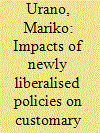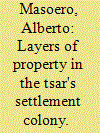| Srl | Item |
| 1 |
ID:
095552


|
|
|
|
|
| Publication |
2010.
|
| Summary/Abstract |
The goal of this paper is to analyse the impact of Russian legislation on the notary activity of sharica courts with regard to transactions involving landed property. The hypothesis is that incorrect assumptions made by Russian lawmakers as to the 'tradition' of Muslims' land rights caused a substantial loophole in the application of colonial substantive laws. On the one hand, the Russian state attempted to retain land ownership for itself by introducing regulations that formally restricted Muslims' land rights to possession and usufruct; on the other hand, the colonial administration never established regulations that ensured that these laws would be enforced by sharica courts and failed to integrate them into the application of Islamic law. Therefore, this paper aims to highlight how the colonial definition of Muslims' land rights was largely disregarded when the Muslim judiciary notarized transactions on land in accordance with sharica. This will lead to the conclusion that the limited effectiveness of the colonial legislation with regard to land in Turkestan stemmed from the failure to reform Islamic procedural law, a process that would have entailed codifying it.
|
|
|
|
|
|
|
|
|
|
|
|
|
|
|
|
| 2 |
ID:
132403


|
|
|
|
|
| Publication |
2014.
|
| Summary/Abstract |
Based on interviews and participant observation conducted in the province of East Kalimantan, Indonesia, from 2008 to 2012, this paper examines why the agrarian reforms have failed to secure the land rights of local farmers. Since the fall of the authoritarian government in 1998, Indonesia has seen limited, but growing government recognition of customary land rights of local farmers living in forest areas. I present a case study of two villages, in which the greater discretion on the part of the local community to negotiate with large-scale oil palm estates has led to the abuse of power by local elites, as well as territorial tensions between local communities. The finding questions the optimistic view that state recognition of customary land rights of communities would automatically lead to the security of landownership of local farmers, and its underlying image of harmonious local communities in which members share coherent interests. The agrarian reform that has centred on communities' rights of control over land and natural resources is problematic. When local communities do not possess capabilities for resolving conflicts in an equitable and transparent manner, third-party intervention is needed to assist communities to strengthen local land rights.
|
|
|
|
|
|
|
|
|
|
|
|
|
|
|
|
| 3 |
ID:
117478


|
|
|
|
|
| Publication |
2012.
|
| Summary/Abstract |
Based on Cambodian and French archival records, which include colonial and local administration reports, tax rosters and judicial sources, this paper explores landownership in Cambodia in the 1930s. It shows that, contrary to common belief, land access was already an issue in the 1930s. The study of tax registers of three communes in the province of Kompong Thom presents a Khmer rural society dominated by peasants with average-sized landholdings, but where landless peasants or those with very small holdings also existed. It also stresses that women were able to become efficient farm operators. In addition, this analysis of the different sources available shows that Khmer rural society in Kompong Thom was a form of gerontocracy dominated by men aged over 40.
|
|
|
|
|
|
|
|
|
|
|
|
|
|
|
|
| 4 |
ID:
190673


|
|
|
|
|
| Summary/Abstract |
This article scrutinises to what extent land ownership improves the well-being of women, focusing on a village in Kerala, a South Indian state known for its land reforms ‘model’ that provided land to the tiller and ownership rights to tenants. However, have these radical land reforms actually succeeded in providing ownership rights to women, thereby contributing to their well-being? We ask in this intensive village study to what extent these admittedly radical land reforms provide adequate land rights to women in Kerala in terms of such ownership translating into absolute and effective rights.
|
|
|
|
|
|
|
|
|
|
|
|
|
|
|
|
| 5 |
ID:
095550


|
|
|
|
|
| Publication |
2010.
|
| Summary/Abstract |
In the 1890s the authorities in St Petersburg attributed enormous value to the introduction (nasazhdenie) of private land property in the eastern peripheral regions. It was considered an urgent task and a fundamental aspect in the overall scheme of building an empire. The article examines the preparatory materials of the 1901 law on land privatization in Siberia - in itself a failure with little practical significance - in the context of other forms of landholding and the peasant resettlement policy, within the social and spatial hierarchy of the imperial periphery. The journals of the Siberian Railroad Committee and other unpublished materials are used to highlight conceptions of individual ownership, the motivations and ideologies of the officials who endeavoured to draft the law. The debate as to who had the right to own land, and why, constantly intersected and mirrored the visions of the desired future of the eastern territories. Private property was treated as an addition to the existing social landscape and as an instrument of transformation. The search for a 'suitable' or 'enlightened' landowner represented an adaptation of the traditional social hierarchy to new conditions and new colonial duties to a large extent.
|
|
|
|
|
|
|
|
|
|
|
|
|
|
|
|